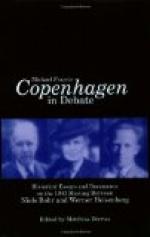|
This section contains 660 words (approx. 3 pages at 300 words per page) |

|
1901-1976
German Physicist
Werner Heisenberg was a pioneer of quantum mechanics, a theory that deals with atomic particles in terms of probability functions. He was awarded the Nobel Prize in physics in 1932 for his formulation of quantum mechanics using matrices, or arrays of mathematical expressions. He is best known for his uncertainty principle, which states that it is impossible to simultaneously and precisely measure the position and velocity of a particle.
Heisenberg was born on December 5, 1901, in Würzburg into a well-to-do academic family. He was a bright and ambitious student, always at the top of his class at the gymnasium (secondary school), and also enjoyed playing classical piano. World War I disrupted this comfortable life, bringing shortages of food and fuel. With most men serving in the military, students were expected to be tough and independent and were indoctrinated with nationalistic views. Heisenberg...
|
This section contains 660 words (approx. 3 pages at 300 words per page) |

|


